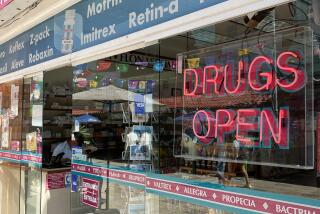Puerto Rican city sees the writing on the wall
CIDRA, PUERTO RICO — First to go was a factory that produced generic drugs. Next, a pharmaceutical supply company said it would close. Then, GlaxoSmithKline said last month it would shut its plant in this central Puerto Rican city.
Many people in Cidra now fear their hillside city, which has depended on pharmaceutical manufacturing for more than 30 years, is terminally ill.
“This is going to be pretty bad for a lot of people,” said Frank Ortiz, a 42-year-old construction worker sitting in a cafe near the gated GlaxoSmithKline campus.
Cidra, a city of about 50,000, is not alone in its sense of looming dread. The pharmaceutical industry appears to be in retreat across Puerto Rico, long a global hub of drug manufacturing thanks to tax breaks and the territory’s unfettered access to the U.S. market.
Over the last 18 months, five major drug manufacturing plants have either closed or announced plans to do so, eliminating 3,000 relatively high-paying jobs. The closures are a largely a result of higher energy costs, changing tax rules and industry consolidation.
Industry experts predict that Puerto Rico is in danger of losing its position among the top five global drug making centers unless the island offers better incentives and shifts toward research.
“We are very good at manufacturing pills, but the pharmaceutical sector in its own way has been changing in the last few years,” said Deepak Lamba-Nieves, research director for the Center for the New Economy, an independent think tank in Puerto Rico.
The island’s pharmaceutical industry, which still produces 13 of the 20 best-selling drugs in the United States, gained dominance in the 1970s with the help of U.S. incentives. It accounts for a quarter of the island’s gross domestic product, with $36.5 billion in annual exports.
Some of the losses have been offset by new investments in biotechnology -- a related industry that Gov. Anibal Acevedo Vila has courted aggressively, marketing the territory as “Bio Island” and developing tax breaks for research and development.
In addition to Cidra plants owned by Teva Pharmaceutical Industries and GlaxoSmithKline, plants owned by Schering-Plough Corp., Watson Pharmaceuticals Inc. and Bristol-Myers Squibb Co. have closed or are part of announced plans to shut down.
Many companies find Puerto Rico is no longer a bargain because of changing tax structures and the cost of electricity supplied by oil-fired power plants.
At least three of the plants that are closing also were facing pressure from the Food and Drug Administration to make investments to resolve quality control problems.
In 2005, GlaxoSmithKline agreed to fix deficiencies that allowed tablets of Paxil, a treatment for depression, to split apart before being used. At the nearby Teva plant, acquired through a recent takeover of Ivax Corp., inspectors last year found drugs contaminated by manufacturing or cleaning equipment.
The U.S. tax breaks that transformed Puerto Rico from an impoverished agrarian society to a manufacturing hub offered the best deals for companies that moved to depressed areas outside the capital.
Wage credits gave companies incentives to create the maximum number of jobs under Section 936 of the Tax Code -- approved by Congress in 1976 to allow companies to send profits to the U.S. with minimal taxes.
Since Section 936 expired last year and companies began reducing their workforces, a cloud of uncertainty has formed over small cities where pharmaceuticals have clustered including Cidra, Manati and Barceloneta.
Companies that run the remaining pharmaceutical manufacturing plants, which employ more than 20,000 people, have kept their taxes low in many cases by declaring their operations here as foreign corporations, allowing them to take advantage of local tax structures.
But with a local law governing industrial tax breaks due to expire next year, some critics say lawmakers’ inability to agree on a renewed version is making investors nervous and driving away business.
More to Read
Inside the business of entertainment
The Wide Shot brings you news, analysis and insights on everything from streaming wars to production — and what it all means for the future.
You may occasionally receive promotional content from the Los Angeles Times.










